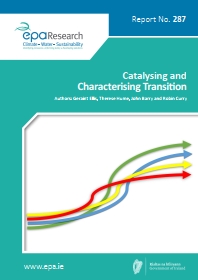Authors: Geraint Ellis, Therese Hume, John Barry and Robin Curry
Summary: This synthesis report presents the main findings from a desk study on Catalysing and Characterising Transition (CCTransitions), which was funded by the Environmental Protection Agency (EPA).

This report reviews the social, economic and political transformations that will be required to achieve a low-carbon transition. Ireland is required to decarbonise its energy systems and make very substantial reductions in its greenhouse gas emissions as a result of international treaties such as the Paris Agreement and European Union commitments on energy and climate, as well as its own legislative initiatives such as the Climate Action and Low Carbon Development Act 2015. These commitments imply very far-reaching changes in the Irish energy regime, which in turn create pressures in many other systems, such as those related to food and mobility. This suggests that transition will require a process of redirecting a wide range of factors (markets, energy technologies, infrastructure, governance, individual behaviour) towards more sustainable configurations. This report reviews the ways in which these pressures can be conceptualised and integrated into a broad approach through which such complex changes can be steered, drawing primarily on transition theory.
The report also reviews the experiences of the Netherlands, Sweden, the UK, Germany, Denmark, Norway and New Zealand to identify key dimensions of their energy transitions, including the landscape forces, dominant actors and scope of niche innovations, which highlight the diverse range of pathways towards transition. This provides insights from international experience, noting the complexity of forces that can act as a driver or barrier to a country’s transition, the benefits of a strong sustainability vision and the way in which incumbent, vested interests can frustrate progress. The report also describes case studies of two technologies in Ireland seen to be central to Ireland’s low-carbon transition, bioenergy and electric vehicles, highlighting that they have considerable opportunities to contribute to the Irish transition, but that they also face significant challenges in order to fully reach their potential. Finally, the report examines how Ireland’s transition can be benchmarked against the progress of other countries.
The report synthesises the theoretical reviews of transition theory, benchmarking and case studies in order to make recommendations on how a transitions approach can be operationalised in an Irish context. This has two key aspects. First, there is a need to develop and consolidate further research capacity for transitions in Ireland and, second, there is a need to initiate a national transition management process. The report highlights a range of strategic actions that could be undertaken by research funders and outlines key topics that could form a transition research programme. It also draws on the transition management approach to outline key steps for a national Irish transition process, consisting of creating a transition team and a national transition arena and encouraging greater experimentation in policy, technology and social innovations that could help stimulate the transformation of the Irish energy system.
https://www.epa.ie/media/epa-2020/publications/research/Research_287_Thumbnail[1].jpg